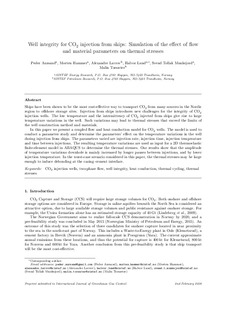Well integrity for CO2 injection from ships: Simulation of the effect of flow and material parameters on thermal stresses
Aursand, Peder; Hammer, Morten; Lavrov, Alexandre; Lund, Halvor; Munkejord, Svend Tollak; Torsæter, Malin
Journal article, Peer reviewed
Accepted version
Permanent lenke
http://hdl.handle.net/11250/2601225Utgivelsesdato
2017Metadata
Vis full innførselSamlinger
- Publikasjoner fra CRIStin - SINTEF Energi [1640]
- SINTEF Energi [1764]
- SINTEF Industri [1566]
Originalversjon
International Journal of Greenhouse Gas Control. 2017, 62 130-141. 10.1016/j.ijggc.2017.04.007Sammendrag
Ships have been shown to be the most cost-effective way to transport CO2 from many sources in the Nordic region to offshore storage sites. Injection from ships introduces new challenges for the integrity of CO2 injection wells. The low temperature and the intermittency of CO2 injected from ships give rise to large temperature variations in the well. Such variations may lead to thermal stresses that exceed the limits of the well construction method and materials.
In this paper we present a coupled flow and heat conduction model for CO2 wells. The model is used to conduct a parameter study and determine the parameters’ effect on the temperature variations in the well during injection from ships. The parameters varied are injection rate, injection time, injection temperature and time between injections. The resulting temperature variations are used as input for a 2D thermoelastic finite-element model in ABAQUS to determine the thermal stresses. Our results show that the amplitude of temperature variations downhole is mainly increased by longer pauses between injections, and by lower injection temperature. In the worst-case scenario considered in this paper, the thermal stresses may be large enough to induce debonding at the casing–cement interface.

